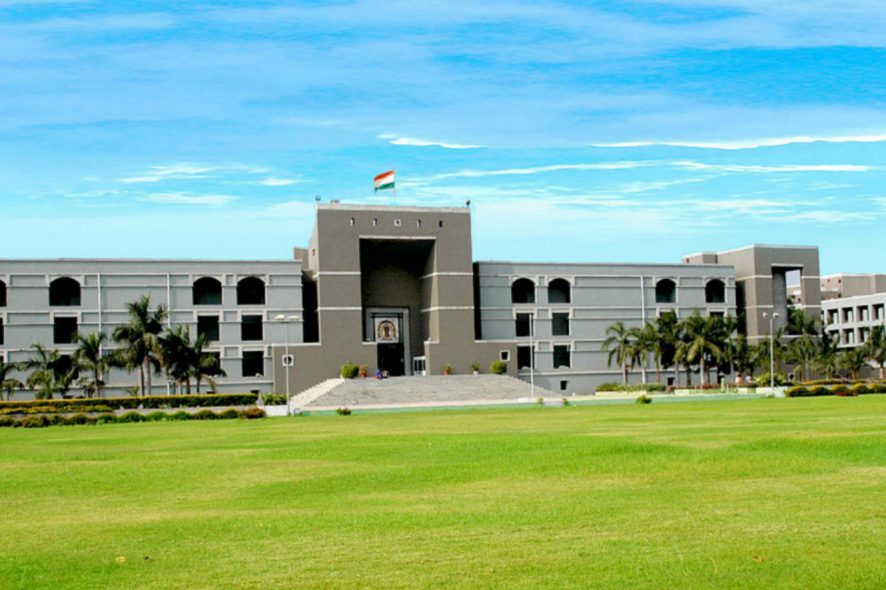Gujarat High Court: A Division Bench of Sonia Gokani and N.V. Anjaria, JJ., while rejecting the unconditional apology of the Yatin Oza, observed that,
“Entire gamut of facts when dispassionately and objectively viewed, we are unable to accept these words as true words of remorse and contrition and therefore, request to accept apology even if termed as unqualified, cannot be acceded to.”
Gambling Den
Respondent Yatin Narendra Oza is the President of the Gujarat High Court Advocates’ Association and was designated as a Senior Advocate of the Bar and in a press conference, he uttered certain statements showing the institution of the Gujarat High Court in very low esteem and terming it as a gambling den.
Suo Motu Notice
On 9-06-2020, suo motu notice was issued taking cognizance by way of the said act, utterances, statement and representations under the Article 215 of the Constitution and under the Cotempt of Courts Act, 1971.
Notice under Section 17 of the Contempt of Courts Act came to be issued to the respondent which was accompanied by the order and the entire material on record.
On 10-06-2020, Full Court of the Gujarat High Court unanimously resolved that proceedings for cancellation/withdrawal of conferment of designation of senior advocate to Yatin Oza be initiated forthwith.
On 18-07-2020, Full Court ended up with the decision.
Disentitled to continue to be worthy of Senior Advocate Designation
Full Court taking view that the President of the Advocates’ Association and the Senior Advocate was guilty of the conduct which has disentitled him to continue to be worthy of the designation of the Senior Advocate, the Full Court had reviewed its earlier decision dated 25th September, 1999 designating him as Senior Advocate and recalled the said decision.
Unqualified Apology
Respondent on 11-08-2020, filed an additional affidavit reiterating that he had no intention whatsoever of scandalizing or lowering the authority of the High Court and further requested to accept the unqualified apology he was tendering.
Section 12 of the Contempt of Court Act
Court while considering the materials on record referred to Section 12 of the Contempt of Court Act which deals with the punishment for contempt of courts while considering the issue whether the apology by a contemnor could be accepted or rejected.
It is not sine qua non to hold a person guilty before the apology is accepted as the provision of the Contempt of Courts Act itself permits both eventualities as mentioned above in Section 12 of the said Act, to discharge an alleged contemnor, if apology is tendered before further proceeding with the matter or for remission of punishment at the end of full fledged trial/proceedings.
“…a deliberate attempt to scandalize the Court which would shake the conscience of the litigating public in the system would cause a very serious damage to the name of the judiciary.”
Court while relying on a nuber of cases, relied on L.D. Jaikwal v. State of U.P, (1984) 3 SCC 405, wherein the Court was more than emphatic that merely because the appellant tendered his apology, he should not go unpunished, otherwise all the persons would intimidate a Judge by make grossest imputation against him, scandalize him and later tender formal empty apology, which costs him practically nothing.
Bench in the present case discharged the respondent on not being satified with the apology.
Not only the present strength of the Bar and Bench and the members of Registry but all those who have in the past 60 years have given their toil and blood to this institution to bring it to the present level, ought to have been regarded.
Further the Court observed that soon after the notice of contempt was issued by this court on 9-06- 2020, the respondent approached the Supreme Court seeking the quashment of notice and although it is right of every litigant to approach the highest court of the country against any action of the court below, this aspect is to be examined when the timings of tendering the apology assumes importance.
Weapon of Unconditional Apology
Bench observed that every time scurrilous remarks against the Judges and the institution are made and when he realises that there is no escape route, the weapon of unconditional apology comes to his rescue.
A clear and loud message is a must to be sent that we are open to every healthy criticism respecting the fundamental right of freedom of expression and at the same time, we are obligated not to permit any attempt to tarnish the image of the Institution.
Therefore Court while refusing to accept Advocate Yatin Oza’a unconditional apology and denying to re-confer him Senior Designation, stated that
“To accept any apology for the conduct of this kind and to condone it would tantamount to a failure on the part of the High Court as an institution of the judiciary to uphold the majesty of the law, the dignity of the institution and to maintain the confidence of people in the judiciary.” [Suo Motu v. Yatin Narendra Oza, 2020 SCC OnLine Guj 1175, decided on 26-08-2020]
Read More:
Yatin Oza offers unconditional apology; SC says one can improve system without imputations







